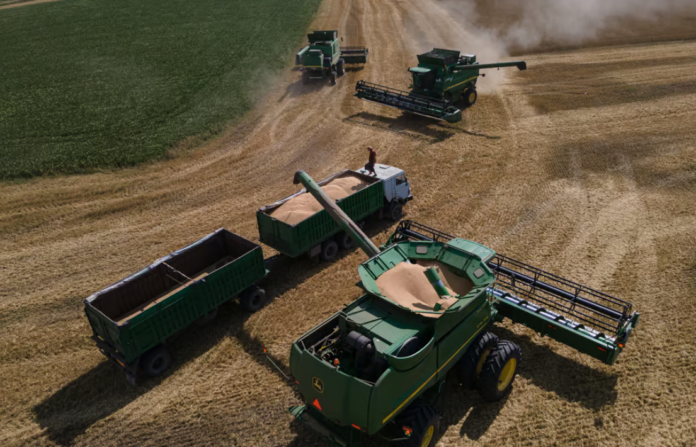EU states and the European Parliament on Monday agreed tougher restrictions on some Ukraine farm imports, European Union presidency holder Belgium said, according to France24.
The accord extends the duty-free access the bloc has given to Ukrainian agricultural goods since Russia’s 2022 invasion, but sets caps for poultry, eggs, sugar, maize, groats and honey to average volumes seen between mid-2021 and end-2023.
No cap was applied to wheat, which countries such as France and Poland had initially argued for.
Lawmakers are eyeing June elections that will usher in a new parliament. Many, especially conservatives and on the far-right, are keen to show European farmers that they are in their corner.
Lawmakers on the European Parliament’s international trade committee are expected on Tuesday to approve tighter restrictions on Ukrainian farm goods as part of temporary trade liberalization measures. The same restrictions were agreed on Monday, after weeks of wrangling, by the Parliament and the EU’s 27 member countries, Politico reports.
Diplomats had previously said the caps would trim around 240 million euros from the amount Ukrainian farm products earn in the EU, compared with 2023.
Ukraine says it supplies only around one percent of the EU’s eggs and two percent of its poultry while making up for a deficit of sugar on the EU market.
The European Union has sought to maintain solidarity with Ukraine while listening to European farmers who have been protesting low incomes partly blamed on Ukrainian goods they say are undercutting their markets.
The extension of duty-free imports of Ukrainian agricultural products is to kick in before the current exemption period runs out on June 5.
The trade liberalization measures, which temporarily remove all outstanding restrictions on Ukrainian imports into the EU to help the country fend off Russia’s war of aggression, are set to expire June 2025. After that, the two sides will return to the terms of their 2016 free-trade agreement, which includes the gradual elimination of all remaining tariffs.
The European Parliament issued a statement saying that if there was “significant disruption to the EU market or the markets of one or more EU countries due to Ukrainian imports, for instance wheat, the regulation ensures that the (European) Commission can take swift action and impose any measures it deems necessary”.
The rapporteur for the accord, Sandra Kalniete of the centre-right PPE grouping, said it “fortified safeguards to protect EU farmers in case of market turbulence sparked by Ukrainian imports.”
“The ripple effects of Russia’s relentless targeting of Ukraine and its economy are being felt by EU farmers,” she said in a statement.
The farmers’ union grouping COPA-COGECA and five farming federations said in a statement that the deal did not go far enough.


